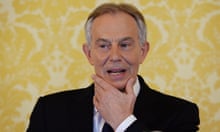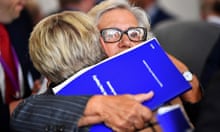Sir John Chilcot’s inquiry has not, in his words, “expressed a view on whether military action [in Iraq] was legal”. That question, he said, could be resolved only by a court. Still less does his report deal with the question of whether Tony Blair or others should face legal action.
However, the Chilcot inquiry did find that the circumstances in which the Blair government decided that there was a legal basis for military action were “far from satisfactory”. The report said that Lord Goldsmith, the attorney general, should have been asked to provide written advice to the cabinet on 17 March 2003 explaining the legal basis on which the UK could take military action and setting out the risks of legal challenge.
In fact, Goldsmith started to give ministers an oral explanation, based on a written answer to a parliamentary question which was handed round the cabinet table, and the discussion then moved on.
Section 5 of the report – nearly 170 pages – is devoted to a detailed analysis of the legal advice given by Goldsmith and how it developed over time. Chilcot concluded that the cabinet was not misled by the attorney general on 17 March.
However, he said that ministers were being asked to confirm a decision that the diplomatic process was at an end and that the Commons should be asked to endorse military action. “Given the gravity of the situation,” says the report, “cabinet should have been made aware of the legal uncertainties.”
The report points out that no minister asked Goldsmith why the advice he had given 10 days earlier – that the safest legal course was to seek a second UN resolution – had changed. “There was little appetite to question Lord Goldsmith about his advice and no substantive discussion of the legal issues was recorded,” Chilcot finds. Goldsmith should have been asked to explain how it could be said that Iraq had reached the point at which it had failed to take the final opportunity offered by UN resolution 1441.
Publication of the Chilcot report is unlikely to put an end to calls for Blair and others to be prosecuted before the international criminal court (ICC). It’s argued that Blair should be charged with the crime of aggression, which includes a military attack or invasion not permitted under the UN charter.
More than a decade ago, the former ICC prosecutor explained that he had a mandate to examine conduct during the Iraq war “but not whether the decision to engage in armed conflict was legal”. Luis Moreno-Ocampo added: “I do not have the mandate to address the arguments on the legality of the use of force or the crime of aggression.” Since then, the crime of aggression has been defined in the ICC’s governing statute. However, this provision has not yet been brought into effect and will not be applied retrospectively. So there is no prospect of anyone facing charges of aggression arising from the Iraq war.
The ICC also has jurisdiction over genocide, crimes against humanity and war crimes committed by UK nationals after June 2002. The current prosecutor, Fatou Bensouda, announced in 2014 that she was reopening a “preliminary examination” into allegations that British officials were responsible for “war crimes involving systematic detainee abuse in Iraq from 2003 until 2008”.
In her latest update last November, Bensouda said that in assessing whether “the alleged crimes fall within the jurisdiction of the court and were committed on a large scale or pursuant to a plan or policy”, she would take into account the findings of the relevant investigations conducted by the UK authorities.
A preliminary examination is not the same as an investigation. Its aim is to decide whether an investigation should be opened. The ICC prosecutor has said she will consider the Chilcot report before deciding whether to open a formal investigation. Announcing this on Monday, Bensouda said that a claim in the Sunday Telegraph that she had “ruled out putting Tony Blair on trial for war crimes” was inaccurate.
Bensouda has been kept informed on the progress of investigations by Ihat, the Iraq historic investigations team, and will take its findings into account. This is of immense importance because the ICC steps in only where the state concerned is “unwilling or unable genuinely to carry out the investigation or prosecution”. This is known as the principle of complementarity.
Ihat has nearly 150 staff, including Royal Navy police and civilian investigators. No prosecutions have yet been brought as a result of their work but prosecutors considered bringing charges against two soldiers.
Latest figures supplied to me this week indicate that, by the end of May 2016, Ihat had received 3,363 allegations of potential criminal behaviour. After sifting out cases that did not amount to criminal offences, Ihat is now considering – or has considered – 325 allegations of unlawful killing and 1,343 allegations of ill-treatment, ranging from serious sexual assault to common assault. The figures refer to alleged victims.
Of these 1,668 allegations considered so far, 72 cases of unlawful killing and 18 cases of alleged ill-treatment have been – or are about to be – completed. Ihat has released details of some of its initial decisions. Ihat tells me that the allegation of criminal behaviour was “not sustainable” in 70 of the 72 cases of unlawful killing it has considered.
One allegation of unlawful killing by a soldier has so far been referred to the Service Prosecuting Authority, which takes charging decisions in the same way as the Crown Prosecution Service. The director of service prosecutions, Andrew Cayley QC, decided that there was insufficient evidence to prosecute. A second allegation of unlawful killing was referred to the RAF police for further investigation. Allegations of ill-treatment were also found to be unsustainable in 16 of the 18 cases considered.
One ill-treatment case was referred to the director of service prosecutions, who again decided that there was insufficient evidence to proceed. Another soldier who admitted ill-treatment was referred to his commanding officer for disciplinary action and fined £3,000. Video footage of an incident which showed him abusing an Iraqi man was provided to investigators by the Mail on Sunday.
Families of troops who died in the Iraq war are reported to be taking legal advice on whether Blair and others might face action in the civil courts. On Tuesday, General Sir Michael Rose, who has been advising the families, said action might be taken for what he called “malfeasance in a public office”.
Misconduct in public office is, in fact, a common law offence. The crime, which dates back to the 18th century, has recently been criticised for vagueness by the government’s law reform advisers. It may be committed when a public officer, acting as such, wilfully misconducts himself to such a degree as to amount to an abuse of the public’s trust in him and does so without reasonable excuse or justification.
Although parliament ratified the government’s decision to join the US-led invasion of Iraq, Blair comes in for heavy criticism from Chilcot. Blair presented judgments about Iraq’s capabilities “with a certainty that was not justified”. His conclusions about the aftermath of invasion “did not require the benefit of hindsight”. His omissions “reduced the likelihood of achieving the UK’s strategic objectives in Iraq”.
Blair did not establish clear ministerial oversight of post-conflict strategy. He did not ensure that ministers took the necessary decisions to integrate military and civilian contributions. He did not seek adequate assurances that the UK was in a position to meet its likely obligations in Iraq. He did not ensure that the UK’s strategic objectives were sufficiently tested. He did not press President Bush for assurances about US post-conflict plans. He did not consider whether the absence of such plans was a threat to UK strategic objectives or make post-conflict planning a condition of participation in military action.
Blair’s critics may believe that this amounts to the sort of wilful misconduct envisaged by the judges. On the other hand, authorisation by parliament must surely count as a “reasonable excuse or justification”.
Whether or not the courts would be willing to entertain a prosecution of a former prime minister for what may be seen as political failings, we can be sure that actions such as these were not in the minds of the judges when they developed the crime of misconduct in public office.









